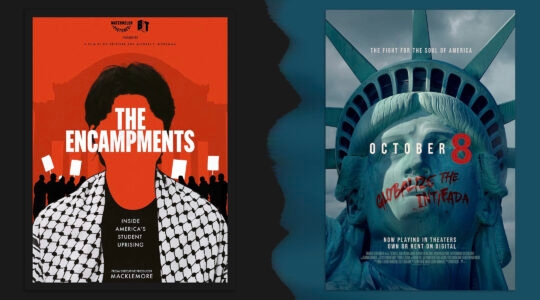NEW YORK (JTA) — Yes, there is a media double standard when it comes to haredi Jews. That’s nothing new.
So when thousands of Iranians poured into Tehran’s streets in protest of what they saw as a fraudulent presidential election, the press emphasis was not on the protesters who threw rocks, set trash bins aflame and vandalized public property. The focus, rightly, was on the bulk of the crowd — peaceful protesters of what they believed to be a fraudulent election.
When tens of thousands of haredim, though, demonstrated in reaction to a decision by the Jerusalem municipality to open a public parking lot on the Jewish Sabbath, increasing traffic in the heart of the Holy City and disturbing the peacefulness of the day of rest, the main coverage was not of the overwhelming mass of the crowd peacefully standing up for the sanctity of the Sabbath but rather of the tiny fraction of the crowd that threw rocks, set trash bins aflame and vandalized public property.
But that fraction of the crowd cannot be ignored by those of us who cringed at, and remain shamed by, its ugly behavior. The rioters may have been boys, but they were our boys. And if boys of ours can imagine that acts of destruction and hooliganism are somehow the right way to stand up for the Sabbath’s honor — leave aside the way to bring non-observant Jews to appreciate the Jewish day of rest — there is much, much work to be done to teach them what Torah is and what it isn’t.
And yes, again there are unanswered questions about the arrest of a Chasidic mother of a long-hospitalized child on suspicion of having starved him. The media, quoting hospital authorities, said the woman was suffering from a mental illness that compels a person to invent or create symptoms of illness, sometimes in another person, in order to garner medical attention.
The hospital video footage, moreover, that authorities said showed the mother removing the child’s feeding tube 20 times has yet, at least at this writing, to be released. And why did the hospital not act after the first tube removal? Or the 10th?
Further, if the woman is in fact mentally ill, why was a simple restraining order not obtained barring her from contact with the child? Why did the police choose instead to slap handcuffs on the five-months pregnant woman in public, in front of a summoned press, and place her in a jail cell — with an accused spouse killer, an Arab woman, as a cellmate?
No one can know with certainty at this point the answers to these questions, or whether the woman at issue is a would-be murderess, a sufferer of mental illness or a caring mother wrongly accused.
What we can know, though, is that the reaction of some members of her community and some other haredim was horrible abuse of its own sort. To review in any detail even a sampling of the repulsive behavior in which some religious Jews engaged would only increase the desecration of God’s name it embodied.
There may well have been grounds for protest — and civil protest is a fundamental right in a democracy — but there were no grounds for violence.
That judgment was made unequivocally by, among others, the head of the anti-Zionist Edah Charedis, the renowned halachic authority Rabbi Moshe Sternbuch.
Referring to the riotous behavior, he wrote, “Anyone who commits acts of violence declares that he doesn’t belong to our community.”
Insulting another is a grave violation of halachah, as is causing him physical harm. Destroying another’s property — or communal property or, for that matter, one’s own property — is also forbidden by the Torah. No exceptions have ever been made in halachic codes for instances where a government policy or action is not to one’s liking.
How ironic that the idealization of boorishness and destructiveness, most prominently embraced by the criminal world and Hollywood, should have managed to infiltrate the relatively insular haredi world — a world that clearly stands for diametric ideals.
This time of Jewish year, Judaism-conscious Jews are focused on the destruction of the Holy Temples. The second Temple, whose destruction led to our current exile, was destroyed, the Talmud teaches, “because of baseless hatred.”
The recent rioters in Jerusalem may well have believed their hatred to have had ample basis. But whatever their rationalizations, their actions evoked disgust in Jews the world over, some of whom, tragically, will generalize from the rioters’ bad example and bear ill will toward haredim as a group.
And so, even if the violent protesters believe that they are innocent of baseless hatred, they should be made to confront the fact that they are deeply guilty of promoting it.
(Rabbi Avi Shafran is director of public affairs for Agudath Israel of America.)
JTA has documented Jewish history in real-time for over a century. Keep our journalism strong by joining us in supporting independent, award-winning reporting.





